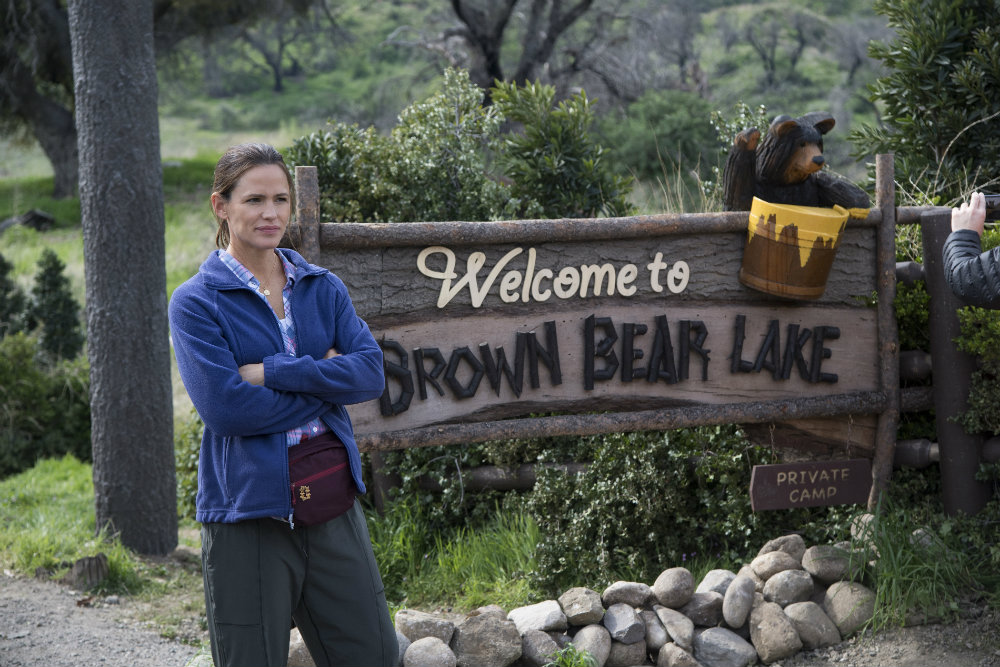Camping should be a great show. The series has a stellar cast, and is the product of two writers, Lena Dunham and Jenni Konner, who already have one runaway hit under their belt in Girls. Unfortunately, Dunham and Konner weren’t able to duplicate their previous success.
The HBO limited series, adapted from the British sitcom of the same name, takes place entirely over a long weekend organized by a furiously type-A hypochondriac named Kathryn Siddell-Bauers (Jennifer Garner), to celebrate the 45th birthday of her long-suffering lapdog husband Walt (David Tennant). The central couple brings a motley crew along with them: kids, siblings, an old college buddy, spouses, one alcoholic in-law. The most crucial addition is Jandice, the rebound girlfriend of a recently separated friend, a woo-woo hippie reiki healer/nude model/notary played with gusto by Juliette Lewis, whose destabilizing presence threatens to ruin Kathryn’s meticulously planned getaway.
Kathryn, the show’s central character, is also its fatal flaw. She is selfish, controlling, and cruel, blaming her abrasiveness on chronic pain and myriad illnesses real and imagined. She invents medical excuses for the fact that she and her husband haven’t had sex for two years. When her son is tackled in a football game, she drags him to the hospital out of fear that he has a concussion, only to hook herself up to machines and bark orders at the staff to run tests on her. Because she believes she doesn’t have any agency over her own body, she overcompensates by micromanaging everyone around her.
Jennifer Garner, bless her, commits to the character. She does her best to in a person who seems to vacuum up the joy in any space she inhabits. Kathryn needn’t be likable for Camping to succeed, of course: current sitcoms like It’s Always Sunny in Philadelphia, You’re the Worst, and Barry are all populated by amoral dirtbags, dipshits, and narcissists. Dunham and Konner’s previous effort, Girls, was centered around characters that were privileged, self-involved, and stuck in a post-college state of arrested development, but the show was still funny and highly watchable, partly because those deeply flawed characters were still able to inspire empathy. Kathryn, however, is all sharp edges, with no warmth or vulnerability to ground her.

Also Read
Anthony Carrigan Loves Surprises
Despite Garner’s best efforts, the premise that a group of people would willingly spend this much time with Kathryn borders on unbelievable, especially on a weekend that’s supposed to be a relaxing cloistered getaway in the woods. Aside from their child, it’s hard to understand why Walt is still with her. (Though midway through the season, we get a taste of his repressed rage through small, quiet acts of passive aggression.) There are other sources of tension that might keep you emotionally invested—between Kathryn and her former best friend Nina-Joy, for instance—but aimless pacing and plot don’t help. Nina-Joy, in particular, seems to exist as a character solely to react to everyone else’s foibles.
There are good performances and sharp jokes embedded in this rudderless story arc, if you stick around long enough to appreciate them. Jandice, the kooky new age free spirit, is not exactly a surprising character for Lewis, but Dunham and Konner give her space to have fun with the role in a way that transcends the potential typecasting. She relishes the opportunity, and the molotov cocktails she throws in Kathryn’s scheduled-to-death outing provide Camping with some of its energetic sequences.
When Lewis needs a break from stealing scenes, walking charisma factory Busy Philipps pops up alongside Nicole Richie, of all people, who is criminally underrated as a comedic actress. The two play a pair of fabulous wine moms, enjoying a bit of Real Housewives-style glamping at a nearby campsite. Chris Sullivan is no slouch either, deftly navigating the irritability and mood wings that come along with his role as a not-quite-recovering alcoholic. (At one point, he tells his wife that her constant narration of their lives makes him feel like he’s “living with David Attenborough,” then proceeds to puke over the side of a lawn chair.) The ensemble cast successfully delivers laughs, but these inspired moments occur in isolation, without connecting to a greater whole.
With Girls, Dunham was writing about her own cohort: anxious, privileged, self-obsessed millennials. Her familiarity with the details of their subjects’ lives, and clear empathy for their struggles, made for a show that felt dynamic and real, even if you weren’t always personally rooting for Marnie and Hannah. Camping could have been an opportunity Dunham to demonstrate her range, as a screenwriter who can render other people’s lives as convincingly as her own. For now, she’s still working on it.




